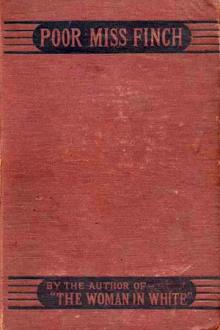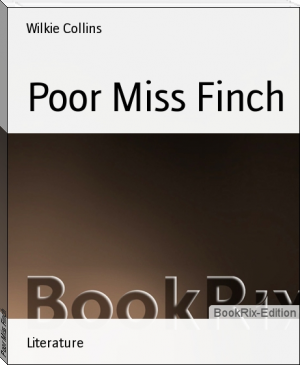Poor Miss Finch - Wilkie Collins (best books to read for beginners txt) 📗

- Author: Wilkie Collins
- Performer: -
Book online «Poor Miss Finch - Wilkie Collins (best books to read for beginners txt) 📗». Author Wilkie Collins
“Most encouraging—nobody can deny it.”
“The second instance was more curious still. This time the case was the case of a grown man—and the object was to show me what strange fantastic images (utterly unlike the reality) the blind form of the people about them. The patient was married, and was to see his wife (as Lucilla is one day to see me) for the first time. He had been told, before he married her, that she was personally disfigured by the scar of a wound on one of her cheeks. The poor woman—ah, how well I can understand her!—trembled for the consequences. The man who had loved her dearly while he was blind, might hate her when he saw her scarred face. Her husband had been the first to console her when the operation was determined on. He declared that his sense of touch, and the descriptions given to him by others, had enabled him to form, in his own mind, the most complete and faithful image of his wife’s face. Nothing that Mr. Sebright could say would induce him to believe that it was physically impossible for him to form a really correct idea of any object, animate or inanimate, which he had never seen. He wouldn’t hear of it. He was so certain of the result, that he held his wife’s hand in his, to encourage her, when the bandage was removed from him. At his first look at her, he uttered a cry of horror, and fell back in his chair in a swoon. His wife, poor thing, was distracted. Mr. Sebright did his best to compose her, and waited till her husband was able to answer the questions put to him. It then appeared that his blind idea of his wife, and of her disfigurement had been something so grotesquely and horribly unlike the reality, that it was hard to know whether to laugh or to tremble at it. She was as beautiful as an angel, by comparison with her husband’s favorite idea of her—and yet, because it was his idea, he was absolutely disgusted and terrified at the first sight of her! In a few weeks he was able to compare his wife with other women, to look at pictures, to understand what beauty was and what ugliness was—and from that time they have lived together as happy a married couple as any in the kingdom.”
I was not quite sure which way this last example pointed. It alarmed me when I thought of Lucilla. I came to a standstill again.
“How did Mr. Sebright apply this second case to Lucilla and to you?” I asked.
“You shall hear,” said Oscar. “He first appealed to the case as supporting his assertion that Lucilla’s idea of me must be utterly unlike what I am myself. He asked if I was now satisfied that she could have no correct conception of what faces and colors were really like? and if I agreed with him in believing that the image in her mind of the man with the blue face, was in all probability something fantastically and hideously unlike the reality? After what I had heard, I agreed with him as a matter of course. ‘Very well,’ says Mr. Sebright. ‘Now let its remember that there is one important difference between the case of Miss Finch, and the case that I have just mentioned. The husband’s blind idea of his wife was the husband’s favorite idea. The shock of the first sight of her, was plainly a shock to him on that account. Now Miss Finch’s blind idea of the blue face is, on the contrary, a hateful idea to her—the image is an image that she loathes. Is it not fair to conclude from this, that the first sight of you as you really are, is likely to be, in her case, a relief to her instead of a shock? Reasoning from my experience, I reach that conclusion; and I advise you, in your own interests, to be present when the bandage is taken off. Even if I prove to be mistaken—even if she is not immediately reconciled to the sight of you—there is the other example of the child and the Indian nurse to satisfy you that it is only a question of time. Sooner or later, she will take the discovery as any other young lady would take it. At first, she will be indignant with you for deceiving her; and then, if you are sure of your place in her affections, she will end in forgiving you.—There is my view of your position, and there are the grounds on which I form it! In the meantime, my own opinion remains unshaken. I firmly believe that you will never have occasion to act on the advice that I have given to you. When the bandage is taken off, the chances are five hundred to one that she is no nearer to seeing you then than she is now.’ These were his last words—and on that we parted.”
Oscar and I walked on again for a little way, in silence.
I had nothing to say against Mr. Sebright’s reasons; it was impossible to question the professional experience from which they were drawn. As to blind people in general, I felt no doubt that his advice was good, and that his conclusions were arrived at correctly. But Lucilla’s was no ordinary character. My experience of her was better experience than Mr. Sebright’s—and the more I thought of the future, the less inclined I felt to share Oscar’s hopeful view. She was just the person to say something or do something, at the critical moment of the experiment, which would take the wisest previous calculation by surprise. Oscar’s prospects never had looked darker to me than they looked at that moment.
It would have been useless and cruel to have said to him what I have just said here. I put as bright a face on it as I could, and asked if he proposed to follow Mr. Sebright’s advice.
“Yes,” he said. “With a certain reservation of my own, which occurred to me after I had left his house.”
“May I ask what it is?”
“Certainly. I mean to beg Nugent to leave Dimchurch, before Lucilla tries her sight for the first time. He will do that, I know, to please me.”
“And when he has done it, what then?”
“Then I mean to be present—as Mr. Sebright suggested—when the bandage is taken off.”
“Previously telling Lucilla,” I interposed, “that it is you who are in the room?”
“No. There I take the precaution that I alluded to just now. I propose to leave Lucilla under the impression that it is I who have left Dimchurch, and that Nugent’s face is the face she sees. If Mr. Sebright proves to be right, and if her first sensation is a sensation of relief, I will own the truth to her the same day. If not, I will wait to make my confession until she has become reconciled to the sight of me. That plan meets every possible emergency. It is one of the few good ideas that my stupid head has hit on since I have been at Dimchurch.”
He said those last words with such an innocent air of triumph, that I really could not find it in my heart to damp his ardor by telling him what I thought of his idea. All I said was, “Don’t forget, Oscar, that the cleverest plans are at the mercy of circumstances. At the last moment, an accident may happen which will force you to speak out.”
We came in sight of the rectory as I gave him that final warning. Nugent was strolling up and down the road on the look-out for us. I left Oscar to tell his story over again to his brother, and went into the house.
Lucilla was at her piano when I entered the sitting-room. She was not only playing—but (a rare thing with her) singing too. The song was, poetry and music both, of her own composing. “I shall see him! I shall see him!” In those four words the composition began and ended. She adapted them to all the happy melodies in her memory. She accompanied them with hands that seemed to be mad for joy—hands that threatened every moment to snap the chords of the instrument. Never, since my first day at the rectory, had I heard such a noise in our quiet sitting-room as I heard now. She was in a fever of exhilaration which, in my foreboding frame of mind at that moment, it pained and shocked me to see. I lifted her off the music-stool, and shut up the piano by main force.
“Compose yourself for heaven’s sake,” I said. “Do you want to be completely exhausted when the German comes tomorrow?”
That consideration instantly checked her. She suddenly became quiet, with the abrupt facility of a child.
“I forgot that,” she said, sitting down in a corner, with a face of dismay. “He might refuse to perform the operation! Oh, my dear, quiet me down somehow. Get a book, and read to me.”
I got the book. Ah, the poor author! Neither she nor I paid the slightest attention to him. Worse still, we abused him for not interesting us—and then shut him up with a bang, and pushed him rudely into his place on the book-shelf, and left him upside down and went to bed.
She was standing at her window when I went in to wish her good night. The mellow moonlight fell tenderly on her lovely face.
“Moon that I have never seen,” she murmured softly, “I feel you looking at me! Is the time coming when I shall look at You?” She turned from the window, and eagerly put my fingers on her pulse. “Am I quite composed again?” she asked. “Will he find me well tomorrow? Feel it! feel it! Is it quiet now?”
I felt it—throbbing faster and faster.
“Sleep will quiet it,” I said—and kissed her, and left her.
She slept well. As for me, I passed such a wretched night, and got up so completely worn out, that I had to go back to my room after breakfast, and lie down again. Lucilla persuaded me to do it. “Herr Grosse won’t be here till the afternoon,” she said. “Rest till he comes.”
We had reckoned without allowing for the eccentric character of our German surgeon. Excepting the business of his profession, Herr Grosse did everything by impulse, and nothing by rule. I had not long fallen into a broken unrefreshing sleep, when I felt Zillah’s hand on my shoulder, and heard Zillah’s voice in my ear.
“Please to get up, ma’am! He’s here—he has come from London by the morning train.”
I hurried into the sitting-room.
There, at the table, sat Herr Grosse with an open instrument-case before him; his wild black eyes gloating over a hideous array of scissors, probes, and knives, and his shabby hat hard by with lint and bandages huddled together anyhow inside it. And there stood Lucilla by his side, stooping over him—with one hand laid familiarly on his shoulder,





Comments (0)